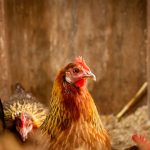Chickens have specific requirements for cold weather survival. While generally cold-hardy, they need extra care during winter months. Fresh, unfrozen water is essential for hydration and maintaining body temperature.
A well-balanced, high-protein, energy-rich diet helps chickens generate body heat. Shelter from wind, rain, snow, and drafts is crucial, as is adequate space for movement and exercise. Chickens possess behavioral and physiological adaptations for cold weather.
They fluff their feathers to create an insulating air layer and roost together at night to share body heat. Different breeds have varying cold tolerance levels, so understanding individual flock needs is important. To ensure chicken health and comfort in winter, owners should provide appropriate nutrition, shelter, and space while considering natural behaviors and breed-specific requirements.
By meeting these needs, chickens can thrive even in cold conditions.
Table of Contents
- 1 Providing proper shelter for chickens in cold weather
- 2 Using heat lamps and heating pads for additional warmth
- 3 Insulating the chicken coop to retain heat
- 4 Using deep bedding for insulation and warmth
- 5 Providing access to sunlight and outdoor exercise
- 6 Monitoring the health and behavior of chickens in cold weather
- 7 FAQs
Key Takeaways
- Chickens need extra care in cold weather to stay healthy and comfortable
- Proper shelter is essential to protect chickens from harsh weather conditions
- Heat lamps and heating pads can provide additional warmth in the coop
- Insulating the coop helps retain heat and keep chickens warm
- Deep bedding provides insulation and warmth for chickens
- Access to sunlight and outdoor exercise is important for the well-being of chickens
- Regular monitoring of chicken health and behavior is crucial in cold weather
Providing proper shelter for chickens in cold weather
Coop Requirements
The chicken coop should be well-ventilated to prevent moisture buildup, but also draft-free to protect the chickens from cold winds. The coop should also be insulated to help retain heat and keep the chickens warm. Additionally, it’s important to provide enough space for the chickens to roost comfortably and move around, as well as nesting boxes for them to lay their eggs.
Coop Maintenance
The coop should also be kept clean and dry to prevent frostbite and other health issues. It’s also important to regularly check for any drafts or leaks in the coop that could let in cold air or moisture.
Outdoor Run Considerations
In addition to the coop, it’s important to provide an outdoor run for the chickens to get some fresh air and exercise, even in cold weather. The run should be protected from snow and ice, and it’s a good idea to cover it with a tarp or other material to provide some protection from the elements.
Using heat lamps and heating pads for additional warmth

In extremely cold temperatures, it may be necessary to provide additional warmth for your chickens. Heat lamps and heating pads can be used to provide extra warmth in the chicken coop. Heat lamps should be hung high enough to prevent the risk of fire or burns, but low enough to provide warmth to the chickens.
It’s important to use heat lamps specifically designed for use with animals, as they are designed to be safe and durable. Heating pads can also be used to provide warmth in the coop, especially for young or sick chickens that may need extra heat. It’s important to monitor the temperature in the coop regularly when using heat lamps or heating pads to ensure that it stays at a safe and comfortable level for the chickens.
It’s important to use caution when using heat lamps and heating pads, as they can pose a fire hazard if not used properly. It’s also important to consider the cost of running heat lamps or heating pads, as they can significantly increase your energy bill. However, in extreme cold temperatures, providing additional warmth for your chickens may be necessary to keep them healthy and comfortable.
Insulating the chicken coop to retain heat
Insulating the chicken coop is an effective way to retain heat and keep the chickens warm during cold weather. There are several ways to insulate a chicken coop, including adding insulation material to the walls, ceiling, and floor of the coop. Common insulation materials include foam board, fiberglass insulation, or even recycled denim insulation.
It’s important to ensure that any insulation material used is non-toxic and safe for use around animals. Additionally, it’s important to seal any gaps or cracks in the coop with caulk or weather-stripping to prevent drafts and heat loss. Another way to insulate the chicken coop is by using straw or hay as bedding material.
This not only provides insulation but also creates a warm and comfortable environment for the chickens. It’s important to regularly clean and replace bedding material to prevent moisture buildup and mold growth. Insulating the chicken coop is an effective way to retain heat and keep the chickens warm during cold weather, ensuring their health and comfort throughout the winter months.
Using deep bedding for insulation and warmth
Using deep bedding in the chicken coop is another effective way to provide insulation and warmth for the chickens during cold weather. Deep bedding refers to adding a thick layer of straw, hay, or wood shavings to the floor of the coop. This not only provides insulation but also creates a soft and comfortable surface for the chickens to walk and roost on.
As the bedding material decomposes, it generates heat which helps keep the coop warm. In addition to providing insulation and warmth, deep bedding also helps absorb moisture and odors, keeping the coop clean and dry. It’s important to regularly turn and fluff the bedding material to prevent compaction and allow for proper airflow.
Adding fresh bedding material as needed will help maintain a clean and comfortable environment for the chickens. Using deep bedding is a cost-effective and natural way to provide insulation and warmth for your chickens during cold weather.
Providing access to sunlight and outdoor exercise

Why Sunlight is Essential for Chickens
Even in cold weather, it’s essential to provide your chickens with access to sunlight. Sunlight is vital for the health and well-being of chickens, as it helps regulate their internal clock and provides essential vitamins such as vitamin D.
The Importance of Outdoor Exercise
Outdoor exercise is also crucial for chickens, as it helps them stay physically fit and mentally stimulated. Even in cold weather, it’s essential to provide your chickens with opportunities for scratching, pecking, and dust bathing.
Providing Access to Sunlight and Outdoor Exercise
Providing access to sunlight and outdoor exercise can be done by providing a covered outdoor run or by allowing your chickens supervised free-range time in a protected area. This will help keep your chickens healthy and active throughout the winter months.
Keeping Your Chickens Healthy and Happy
Providing access to sunlight and outdoor exercise is essential for keeping your chickens healthy and happy during cold weather. By following these tips, you can ensure your chickens stay happy and healthy even in the coldest of months.
Monitoring the health and behavior of chickens in cold weather
Monitoring the health and behavior of your chickens is crucial during cold weather. It’s important to regularly check on your flock for signs of illness or distress, such as lethargy, decreased appetite, or unusual behavior. Additionally, it’s important to monitor the temperature and humidity levels in the chicken coop regularly to ensure that they are at safe levels for the chickens.
Regularly inspecting the coop for drafts, leaks, or other issues that could affect the health and comfort of your flock is also important. It’s also a good idea to keep an eye on your chickens’ feet, combs, and wattles for signs of frostbite, especially in extremely cold temperatures. By monitoring the health and behavior of your chickens in cold weather, you can quickly identify any issues and take appropriate action to ensure the well-being of your flock.
In conclusion, understanding the needs of chickens in cold weather is essential for providing proper care and ensuring their health and comfort throughout the winter months. Providing proper shelter, using heat lamps and heating pads when necessary, insulating the chicken coop, using deep bedding for insulation and warmth, providing access to sunlight and outdoor exercise, and monitoring their health and behavior are all important aspects of caring for chickens in cold weather. By taking these steps, you can help your flock stay healthy and happy even when temperatures drop.
If you’re looking for more tips on keeping poultry warm and healthy, you might want to check out this article on how to care for goslings. It offers valuable insights on providing the right environment for young birds and ensuring their well-being.
FAQs
What are the best ways to keep chickens warm outside?
Some of the best ways to keep chickens warm outside include providing a well-insulated coop, using heat lamps or heated pads, and ensuring good ventilation while blocking drafts.
What temperature is too cold for chickens?
Chickens can tolerate cold temperatures quite well, but they start to feel uncomfortable when the temperature drops below 20°F (-6°C). It’s important to provide them with a warm and dry shelter during extremely cold weather.
How can I insulate my chicken coop?
You can insulate your chicken coop by using materials such as straw, hay, or wood shavings. You can also add insulation to the walls and ceiling of the coop to help retain heat.
Are heat lamps safe for chickens?
Heat lamps can be safe for chickens if they are used properly and securely installed. It’s important to keep them away from flammable materials and to monitor them regularly to prevent any accidents.
Should I use a heated waterer for my chickens in the winter?
Using a heated waterer for your chickens in the winter is a good idea to prevent their water from freezing. It’s important to ensure that the heated waterer is designed for poultry and is placed in a secure location.
Meet Walter, the feathered-friend fanatic of Florida! Nestled in the sunshine state, Walter struts through life with his feathered companions, clucking his way to happiness. With a coop that’s fancier than a five-star hotel, he’s the Don Juan of the chicken world. When he’s not teaching his hens to do the cha-cha, you’ll find him in a heated debate with his prized rooster, Sir Clucks-a-Lot. Walter’s poultry passion is no yolk; he’s the sunny-side-up guy you never knew you needed in your flock of friends!







